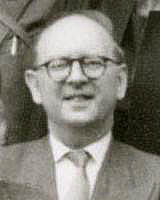Léon Rosenfeld

Léon Rosenfeld (14 August 1904, Charleroi – 23 March 1974[1]) was a Belgian physicist. He obtained a PhD at the University of Liège in 1926, and he was a close collaborator of the physicist Niels Bohr. He did early work in quantum electrodynamics that predates by two decades the work by Dirac and Bergmann.[2] Rosenfeld contributed to a wide range of physics fields, from statistical physics and quantum field theory to astrophysics.[3] Along with Frederik Belinfante, he derived the Belinfante-Rosenfeld stress-energy tensor. He also founded the journal Nuclear Physics and coined the term lepton.[4]
Awards and honors
Rosenfeld held chairs at multiple universities: Liège, Utrecht, Manchester, and Copenhagen.[3]
In 1949 Léon Rosenfeld was awarded the Francqui Prize for Exact Sciences.[3]
Personal life
Rosenfeld was a polyglot who knew eight or nine languages and was fluent in at least five of them.[3]
In 1933, Rosenfeld married Dr. Yvonne Cambresier, who was one of the first women to obtain a Physics Ph.D from a European university. They had a daughter, Andée Rosenfeld (1934-2008) and a son, Jean Rosenfeld.[5]
References
- ^ Léon Rosenfeld's Marxist defense of complementarity, by Anja Skaar Jacobsen [1]
- ^ Leon Rosenfeld and the challenge of the vanishing momentum in quantum electrodynamics, by Donald Salisbury [2]
- ^ a b c d Jacobsen, Anja Skaar. Léon Rosenfeld: Physics, Philosophy, and Politics in the Twentieth Century. doi:10.1142/7776.
- ^ Rosenfeld, Léon (1948). Nuclear Forces. Interscience Publishers, New York, xvii.
- ^ Smith, Claire. "Andree Jeanne Rosenfeld (1934-2008)". ResearchGate. Retrieved 28 November 2015.
External links
 Media related to Léon Rosenfeld at Wikimedia Commons
Media related to Léon Rosenfeld at Wikimedia Commons- Transcript of an interview with Rosenfeld
